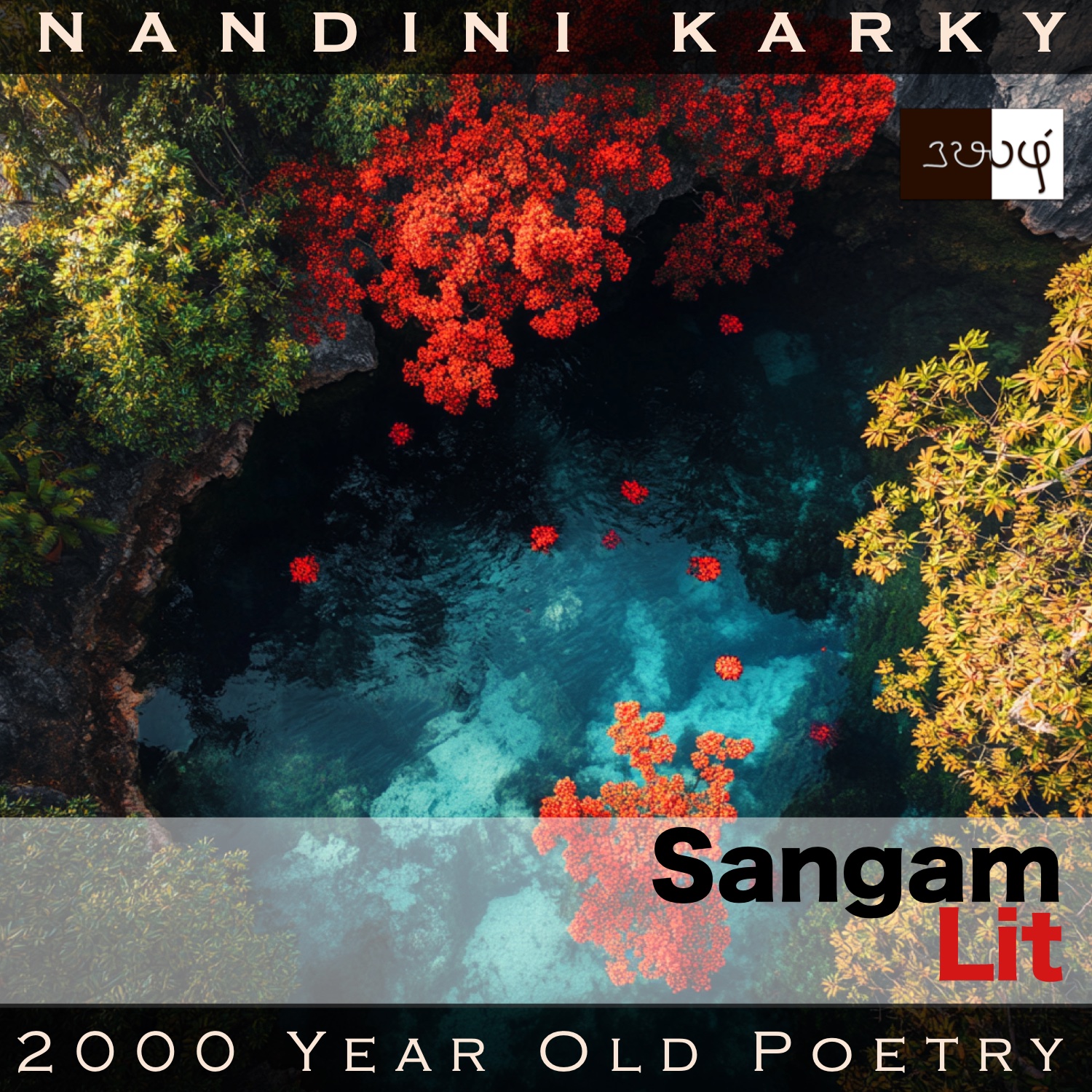Podcast: Play in new window | Download
Subscribe: Apple Podcasts | Spotify | Amazon Music | Android | iHeartRadio | TuneIn | RSS | More
In this episode, we perceive how the changes in the season affects the lady, as portrayed in Sangam Literary work, Kalithogai 33, penned by the Chera King Paalai Paadiya Perunkadunko. The verse is situated in the ‘Paalai’ or ‘Drylands landscape’ and reveals an intricate truth about perception.

‘வீறு சால் ஞாலத்து வியல் அணி காணிய
யாறு கண் விழித்த போல், கயம் நந்திக் கவின் பெற,
மணி புரை வயங்கலுள் துப்பு எறிந்தவை போல,
பிணி விடு முருக்கு இதழ் அணி கயத்து உதிர்ந்து உக,
துணி கய நிழல் நோக்கித் துதைபு உடன் வண்டு ஆர்ப்ப,
மணி போல அரும்பு ஊழ்த்து மரம் எல்லாம் மலர் வேய,
காதலர்ப் புணர்ந்தவர் கவவுக் கை நெகிழாது,
தாது அவிழ் வேனிலோ வந்தன்று; வாரார், நம்
போது எழில் உண்கண் புலம்ப நீத்தவர்!
எரி உரு உறழ இலவம் மலர,
பொரி உரு உறழப் புன்கு பூ உதிர,
புது மலர்க் கோங்கம் பொன் எனத் தாது ஊழ்ப்ப,
தமியார்ப் புறத்து எறிந்து எள்ளி, முனிய வந்து,
ஆர்ப்பது போலும் பொழுது; என் அணி நலம்
போர்ப்பது போலும் பசப்பு
நொந்து நகுவன போல் நந்தின, கொம்பு; நைந்து உள்ளி
உகுவது போலும், என் நெஞ்சு; எள்ளி,
தொகுபு உடன் ஆடுவ போலும், மயில்; கையில்
உகுவன போலும், வளை; என் கண் போல்
இகுபு அறல் வாரும் பருவத்தும் வாரார்;
மிகுவது போலும், இந் நோய்
நரம்பின் தீம் குரல் நிறுக்கும் குழல் போல்
இரங்கு இசை மிஞிறொடு தும்பி தாது ஊத
தூது அவர் விடுதரார் துறப்பார்கொல்? நோதக,
இருங் குயில் ஆலும் அரோ.’
என ஆங்கு,
புரிந்து நீ எள்ளும் குயிலையும், அவரையும், புலவாதி
நீல் இதழ் உண்கணாய்! நெறி கூந்தல் பிணி விட,
நாள் வரை நிறுத்துத் தாம் சொல்லிய பொய் அன்றி,
மாலை தாழ் வியன் மார்பர் துனைதந்தார்
கால் உறழ் கடுந் திண் தேர் கடவினர் விரைந்தே.
The lady and the confidante are at it again, discussing the man’s absence! The words can be translated as follows:
“Like a river that opens its eyes to see the spreading beauty of this majestic world, adding absolute beauty to the pond, looking as if a coral has been thrown into a sapphire-hued vessel, the ‘Indian coral tree’ flower petals that have abandoned ties to their twigs lie scattered on the pond. Looking at their shadows at the crystal clear waters of the pond, bees buzz around; Bursting with buds akin to gems, all trees blossom; Those who are united with their beloved loosen not their embraces; And so, the season of spring that showers pollen has arrived, but the one who parted away, making my flower-like, kohl-streaked eyes shed tears, has not returned!
Akin to fire, the silk-cotton tree blooms; Akin to puffed rice, the beechwood flowers bloom; The new flowers of the buttercup tree shed pollen akin to gold; As if it is mocking at the backs of those who are alone, bringing hatred, resounding comes the evening; And so my excellent beauty is enveloped by pallor!
As if they are teasing and laughing at me, the branches are filled with flowers; Seeing this, my heart worries and suffers; The peacocks seem to mock at me and dance together; My bangles seem to slip away from my hands; Akin to the streaks of tears from my eyes, streams flow in this season and yet he hasn’t come;
This affliction soars beyond measure; Akin to how the flute keeps in tune with the sweet notes of the lute, with resounding music, bees and beetles feed on pollen, and yet, he sends not even a message. Will he abandon me? Lo! Making me ache, the black cuckoos call out aloud!
And so, saying all this, don’t lament about those mocking cuckoos and your man, O maiden with blue-petaled, flower-like, kohl-streaked eyes! To loosen your wavy hair, to not falsify the promise he gave about the day he would return, your companion, who wears a low hanging garland upon his chest, comes riding his wind-like, sturdy and speedy chariots with much haste.”
Time to explore the details. The verse is situated in the context of the man’s parting from the lady after marriage and starts in the voice of the lady and ends in the voice of the confidante. The lady, is still in the same mood she has been in the past few verses, wherein she notes how spring has come but her man hasn’t. In this verse, we are given to understand that in this season of spring, coral tree flowers lie scattered on ponds, bees buzz around and anyone who’s blessed to be with their beloved makes sure not to loosen the grip of their embrace. Next, the lady talks about the flowering of the silk-cotton tree, like fire, that of the beechwood tree, like puffed rice and that of the buttercup tree, like gold. She remarks how the evening time seems to be mocking at her. And this feeling of teasing and laughing at her, she also sees in the branches brimming with flowers and the dance of peacocks. Owing to all this, her bangles slip away and tears flow like streams. Yet, of no avail! Even as bees and beetles match their resounding like the playing of a flute and a lute, the man does not send any message, the lady laments, and just as she hears a cuckoo sing, that seems to drive a deeper wedge into her heart!
Hearing all this, our good confidante asks the lady not to hate the cuckoo or her lover, and informs the lady that the man wanting to fulfil his promise to the lady, was at the moment rushing back on his chariot, riding like the wind! With that cheerful and positive message, the confidante concludes her words. The point I would like to zoom on to in this verse is the way the lady seems to think that all those natural events in the world around her seemed to be happening only to mock at her and this tells us something profound about perception. Sangam Lit makes us witness the truth of the statement: ‘We see the world not as it is, but as who we are’!




Share your thoughts...